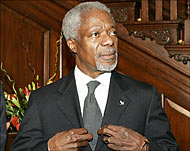US presses UN on abortion
The Bush administration has insisted that a UN document on female equality clarify that abortion is not a fundamental right.

UN Secretary-General Kofi Annan also came in for US criticism for his past use of the term “sexual rights”.
“There is no fundamental right to abortion,” said Ellen Sauerbrey, the US delegate to the UN Commission on the
Status of Women, on Monday.
“And yet it keeps coming up, largely driven by NGOs [non-governmental groups] trying to hijack the term and trying to make it into a definition,” she said.
She would not name any of the activist groups.
The UN meeting in New York, with at least 100 government delegations, 80 ministers from Afghanistan to Peru, and some 6000 advocates of women’s rights, was called to review progress since a landmark global conference in Beijing 10 years ago.
Controversies
Rather than producing a lengthy document, the organisers decided to keep controversies in check by writing a short declaration that reaffirms and pledges implementation of the 150-page platform of action agreed to in Beijing.
 |
|
Annan’s use of the term ‘sexual |
But, to the dismay of European and some Latin American delegates, the United States submitted amendments, declaring that the Beijing conference did not create “new international human rights” and did not include the right to abortion.
In Beijing, abortion was treated as a health issue, with the 150-page platform saying it should be safe where it was legal and criminal action should not be taken against women who underwent the procedure.
The Bush administration does not disagree with this position but has instituted a variety of policies to make sure any US foreign assistance is not used for abortions.
Sauerbrey referred to “sexual rights” which she said were
undefined and one reason the US amendments opposed any new international rights. She noted Annan had used the term.
Beijing conference
Annan has in the past noted that half a million women die of pregnancy-related causes every year.
The 1995 Beijing conference called for governments to end discrimination against women in education, healthcare, politics, employment, inheritance rights and many other fields.
|
“There is no fundamental right to abortion. And yet it keeps coming up largely driven by NGOs trying to hijack the term and trying to make it into a definition” Ellen Sauerbrey, US delegate to the UN Commission on the Status of Women |
It broke new ground by stating that women, and in many cases girls forced to marry young, had the right to decide how often they would have children “without coercion”.
The United States has also drafted two resolutions on sex trafficking and prostitution and on empowering women economically, which will refer to property rights, Sauerbrey said.
Women now own about 2% of all land but produce half
the food grown, UN figures show. In many societies, the right for women to own and inherit property is neglected and, in some countries, forbidden.
Trafficking
More controversial is a draft resolution on trafficking which Sauerbrey said would take small steps towards outlawing prostitution by asking for research into the relationship of sex tourism and luring women and girls into brothels.
“We know legalised prostitution is a big part of some nations’ economy,” Sauerbrey said. “Getting countries to acknowledge there is a relationship between legalised prostitution … and trafficking is the next step.”
UN figures say that 90% of foreign sex workers in the Balkans are victims of trafficking and at least 700,000 people, mostly women and children, are trafficked each year across international borders.
Girls as young as 13 from Asia and eastern Europe are trafficked as “mail-order brides”.